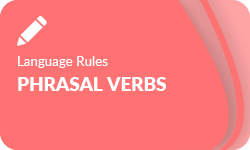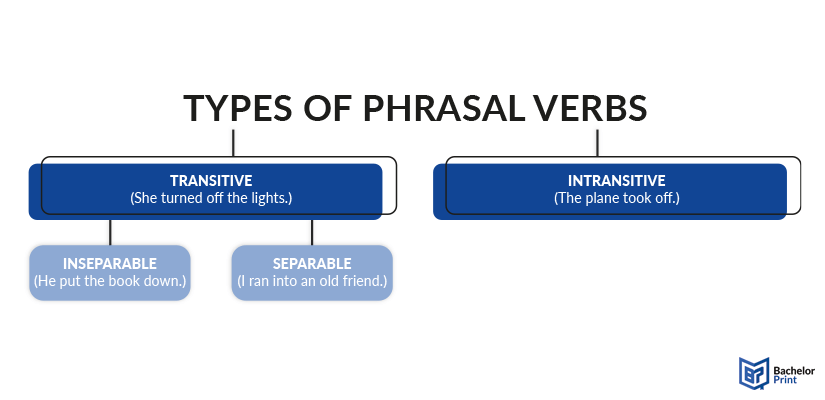
Phrasal verbs, while often considered more casual, can still play a role in academic writing, contributing to the versatility and expressiveness of your language. Understanding the language rules of using these multi-word verbs, which consist of a verb combined with a preposition or adverb, is key to employing them appropriately and effectively. With the correct usage of phrasal verbs, you can add nuance to your arguments and make your academic writing more dynamic.
Definition: Phrasal verbs
A phrasal verb consists of a main verb and one or two particles (prepositions or adverbs) that, together, form a new meaning. This meaning is often idiomatic and can’t be understood by looking at the individual words alone.
Phrasal verbs are widely used in both casual and formal contexts and can express actions, states, or relationships more vividly than simple verbs.
Phrasal verbs can be classified into the following two pairs:
- Transitive
- Intransitive
- Separable
- Inseparable
How to conjugate phrasal verbs
Phrasal verbs follow the same grammatical rules as regular verbs when it comes to conjugation. The main verb is conjugated for tense and subject, while the particle(s) remain unchanged. This means you can use phrasal verbs confidently in various tenses when writing essays, giving presentations, or participating in discussions.
Note: Many phrasal verbs are based on irregular verbs, such as “go,” “get,” or “take,” so it’s important to memorize their past forms when learning them.
Phrasal verbs in the present simple tense follow standard rules: add the suffix -s to the third-person singular form. This tense is commonly used to describe routines, habits, or general truths. This is useful for describing academic processes or study habits.
To describe completed actions in the past, conjugate the verb to simple past according to whether it’s regular or irregular. This helps recount past experiences or summarize previous research.
To express future actions or intentions, combine the phrasal verb with “will” or “going to.” This tense is often used when outlining plans, schedules, or next steps in an academic context.
The present continuous tense uses “to be” + the -ing form of the main verb. It’s useful when emphasizing ongoing processes, especially in spoken or written explanations of research procedures or tasks in progress.
Summary
Lastly, here’s a conjugation table with the example of “go through.”
Types
Phrasal verbs can be grouped into four main types based on whether they take an object and whether the verb and particle can be separated. Understanding these categories helps you use them more accurately in writing and conversation.
Note: Some phrasal verbs can belong to more than one category, depending on how they are used in context. For example, “break down” can be intransitive when referring to a machine (The car broke down), but transitive when referring to data (She broke the data down into categories).
A transitive phrasal verb requires an object in the sentence to complete its meaning. The object typically follows the verb and particle combination.
An intransitive phrasal verb does not take an object. These verbs often describe actions or states that do not need an object to complete their meaning.
A separable phrasal verb allows the object to be placed between the verb and the particle. This is optional when using a noun, but mandatory when using a pronoun.
However, when the object is a pronoun (e.g., it, him, them), it must go between the verb and the particle. This rule applies to all separable phrasal verbs when the object is replaced by a pronoun.
With inseparable phrasal verbs, the verb and the particle must stay together. The object always comes after the full phrasal verb.

Comparison
To better understand how phrasal verbs function, here’s a quick comparison of the four main types. The table shows whether they need an object and whether the verb and particle can be separated.
Printing Your Thesis With BachelorPrint
- High-quality bindings with customizable embossing
- 3D live preview to check your work before ordering
- Free express delivery
Configure your binding now!
List of common phrasal verbs
Phrasal verbs can have multiple meanings depending on context. Here’s a list of commonly used ones, especially useful for academic, everyday, and professional English.
Phrasal verb
Meaning
Example
To get to
To arrive swh
I usually get to college early.
To go on
To continue
The meeting went on for hours.
To get on
To board (a vehicle)
Be careful when getting on trains.
To have a good relationship
I get on with my sister-in-law.
To continue working
We need to get on and finish the job.
To take out
To remove sth
The dentist took out my tooth.
To arrange/contract
Motorists have to take out insurance.
To take up
To lift/carry sth
Let’s take the shopping up now!
To start a new activity/hobby
He took up painting after retiring.
To go into
To enter (a place or space)
Yesterday, I went into the hardware store.
To look into
To investigate/examine
The committee will look into it.
To run into
To meet unexpectedly
I ran into my old professor at the library.
To give up
To stop doing sth
She gave up smoking last year.
To back up
To save or support sth
Make sure to back up your files regularly.
To check out
To examine or look at sth
Check out the article I mentioned.
To end up
To reach an unexpected result/place
We ended up choosing the second topic.
To find out
To discover/learn sth
I found out the answer online.
Want to explore more? Download the full PDF with even more phrasal verbs and their meanings here.
Exercise
Practice makes perfect! Use the following exercises to test your understanding of phrasal verbs and improve your fluency. You’ll encounter phrasal verbs commonly used in both academic and everyday contexts.
Match the meaning
FAQs
Common phrasal-prepositional verbs include:
- To go on
- To go in
- To go out
You can find more in our list of common phrasal verbs.
They came from the old Norse, Germanic, and Saxon roots of English, in which short words dominated. However, after the Norman invasion of England in 1066, Anglo-French (Latin-based) language inputs prevailed.
Generally, these verbs are more conversational and informal than their Latin-based equivalents. Thus, they tend to be more common in everyday conversation.
Yes, many have multiple meanings.
For instance, “making up” can mean “reconciling,” “applying cosmetics,” “inventing a story,” or “compensating for lost time.”
